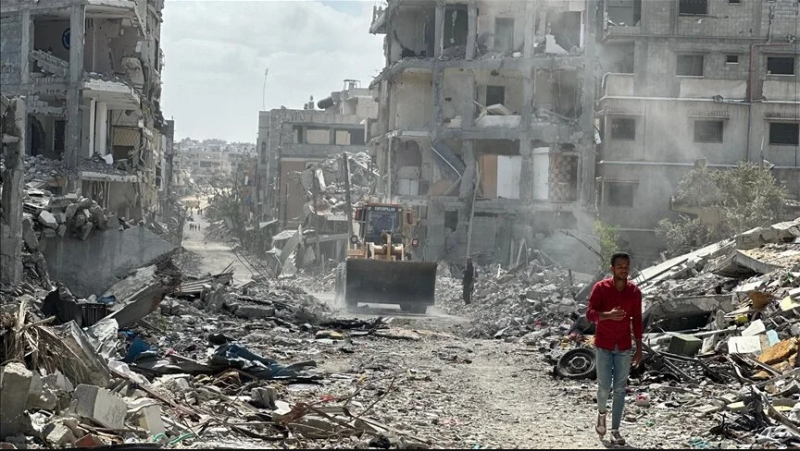Bilawal Kamran
In one of the most disturbing juxtapositions in modern international politics, former U.S. President Donald Trump hosted Israeli Prime Minister Benjamin Netanyahu at a formal White House dinner — while, thousands of miles away, Gaza burned under the weight of another Israeli military campaign. This symbolic meeting, complete with fine dining and diplomatic flattery, revealed the staggering moral dissonance that defines the contemporary global order. As civilians in Gaza continue to suffer from bombardment, displacement, and starvation, their plight was eclipsed by a grotesque moment of political theater: Netanyahu, a man accused by international human rights groups of orchestrating a campaign of mass killings in Gaza, nominated Donald Trump for the Nobel Peace Prize.
Such scenes are not simply insensitive — they are chilling. They signal a normalization of state violence under the guise of diplomacy, and a deliberate erasure of Palestinian suffering. For over 21 months now, Israeli forces have engaged in relentless attacks on the Gaza Strip, killing tens of thousands and rendering large portions of the territory uninhabitable. Yet, instead of condemnation, the architects of this violence receive accolades and red carpet receptions.
The implications of this White House meeting go beyond symbolism. While ceasefire negotiations reportedly continue in the background, the intentions of the Israeli state remain resolutely fixed on a long-term strategy: the ethnic cleansing of Palestinian lands. Netanyahu’s remarks at the dinner underscored this objective. When questioned about the prospect of a Palestinian state, he coldly responded with “never again,” asserting that “overall security will always remain in our hands.” This rhetoric reveals a worldview in which Palestinian sovereignty is not only undesirable but inconceivable — a threat to be preemptively crushed.
Please, subscribe to the YouTube channel of republicpolicy.com
In this security doctrine, “peace” is not defined by coexistence, but by control and domination. Israel, under Netanyahu, reserves for itself the right to use overwhelming force against any Palestinian resistance, however symbolic or peaceful. In practical terms, this means that any attempt by Palestinians to assert their rights — be it through protest, international legal appeals, or grassroots activism — is treated as an act of terrorism warranting military suppression.
Netanyahu’s remarks about Gaza were even more chilling. The prime minister alluded to plans for mass displacement, suggesting that Palestinians in Gaza should be relocated to other countries — a clear expression of ethnic cleansing. His defence minister elaborated further, outlining a strategy in which the population of Gaza would be forced into Rafah, effectively creating a massive concentration camp, and subjected to “deradicalisation” before being encouraged to leave.
This euphemistic language hides a horrifying reality. The so-called encouragement for Palestinians to emigrate would, in effect, be built on starvation, displacement, and psychological trauma. Indeed, Gaza has already become a humanitarian disaster zone. Hospitals have collapsed. Basic infrastructure has been destroyed. Entire families have been wiped out. Since October 7, 2023, Israel’s assault has reportedly killed over 57,000 people. Yet a more recent and rigorous mortality survey conducted by Western experts suggests that the true figure may be closer to 83,000. These are not just numbers — they represent human lives, the majority of them women and children.
And yet, the world remains paralyzed. The United Nations has failed to act decisively. Western governments continue to supply Israel with weapons and political cover. Arab states, too, have been largely mute. The global public watches in horror, but effective pressure to halt the massacre remains elusive. The international order, which once claimed to be based on human rights and legal norms, appears hollow in the face of such atrocities.
What is perhaps most alarming is the ideological shift underlying Israel’s current campaign. Modern political Zionism, once framed as a movement for Jewish self-determination and safety, now mirrors many of the violent, supremacist ideologies it once opposed. Like the Nazis of 20th-century Europe, the modern Israeli leadership justifies collective punishment, population displacement, and systemic dehumanization in the name of security. The irony is tragic: a state formed in response to genocide now stands accused of perpetuating one.
But unlike Nazism, which is universally condemned, Zionist extremism enjoys the complicity — if not the open support — of many Western powers. Netanyahu and his allies are not pariahs on the world stage. Instead, they are welcomed into presidential palaces, celebrated at diplomatic events, and rewarded with economic and military aid. This double standard underscores a fundamental hypocrisy in international relations: the value of human life is not universal but conditional — based on race, nationality, and strategic interest.
Palestinians, particularly in Gaza, have endured decades of occupation, siege, and war. Yet their resilience endures. As Israeli leaders devise new schemes of expulsion and domination, the people of Gaza refuse to surrender. Their resistance is not only political — it is existential. They are determined to live and die on their land, even as the world turns its back.
The Trump-Netanyahu dinner, framed as a celebration of peace and alliance, is in fact a dark reminder of how far global politics has drifted from morality and justice. It is a call to conscience — not just for governments, but for civil society, media, and individuals across the world. In the face of organized cruelty and diplomatic deception, silence is complicity. The world must choose whether to uphold the dignity of all human beings — or continue dining with tyrants while children die in the rubble of Gaza.
















